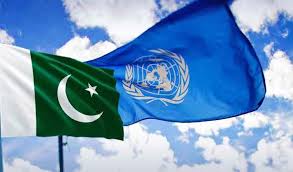Pakistan urges UN-backed framework to govern cyberspace facing threats from technologies’ misuse

Abdullah Jan
United Nations: A senior Pakistani diplomat has called for a U.N.-backed legally-binding comprehensive framework to govern global cyberspace that he said was the common heritage of mankind.
“Threats from ungoverned global cyberspace prompted Pakistan to establish a national position on this critical issue,” Ambassador Usman Jadoon, deputy permanent representative of Pakistan to the UN, said at an event sponsored by the United Nations Institute for Disarmament Research (UNIDIR) at UN Headquarters on Thursday
“Like many countries,” he said, “we face significant challenges from the misuse of Information and Communication Technologies (ICTs).” Cyber-attacks, cyber-terrorism, disinformation campaigns, and attacks on critical infrastructure directly impact regional and global security, the Pakistani envoy said.
Offensive cyber capabilities possessed by certain states and sophisticated hacking tools available to non-state actors have turned cyberspace into an arena of conflict, he pointed out.
“In given circumstances, Pakistan believes that it’s time to create a legally-binding comprehensive framework, under the UN’s auspices, to govern global cyberspace,” Ambassador Jdood added.
The unique nature of ICTs, he said complicates the application of international law in cyberspace as the borderless nature of the internet leads to a fragmented legal landscape, hindering cohesive international cooperation.
Pakistan advocates the application of UN Charter principles in cyberspace, including non-use of force, sovereign equality, non-intervention, and peaceful dispute resolution, he said. At the same time, he said, the transnational nature of cyber technologies reveals gaps in the existing international law framework, making the application of these principles challenging.
Acknowledging the difficulties in applying International Humanitarian Law (IHL) in cyberspace, Ambassador Jadoon emphasized that the interconnected nature of the internet necessitates transformations in the existing IHL framework to uphold cardinal principles such as distinction, proportionality, and precaution.
He said that attributing cyberattacks and malicious activities is particularly challenging due to the anonymity and transnational nature of the internet. He further stated that additionally, the absence of capacity building among states significantly hinders the application of international law in cyberspace.
Ambassador Jadoon called for fair, equitable, and non-discriminatory access to cyber technologies and related products to ensure a safe, secure, and stable cyberspace.
In view of these challenges, he expressed Pakistan’s support for an objective debate under the auspices of the UN to discuss the means and methods of applying international law in cyberspace, including the formulation of a legally binding instrument.
“Pakistan remains steadfast in its commitment to addressing the threats posed by unregulated cyberspace and the malicious use of ICTs. We call on the international community to work together to create a secure and stable cyberspace for all,” the Pakistani envoy added.





